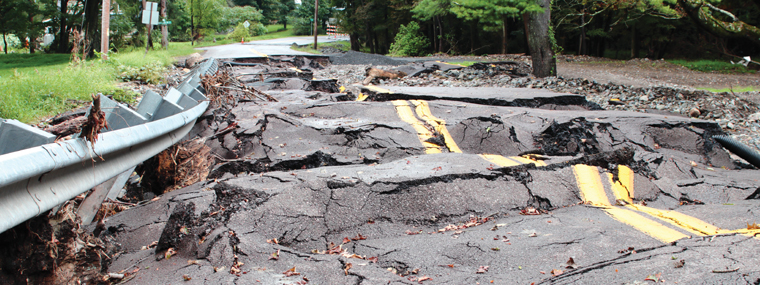
Run, Don’t Walk
Seek Professional Help with Property Damage Claims
By Amy Boggs, Esq. / Published January 2019

Property damage? Condominium and homeowners association boards groan at the thought of it. The complaints, the insurance, the assessment, the repairs…it’s a long and thankless journey. If I had to choose only one piece of advice to give condominium and homeowners associations, it would be this: run, don’t walk, to get professional help when you have a property damage claim.
I’ve been practicing law for 18 years; my practice is devoted to helping policyholders with property insurance claims. Hands down, the most frequent and costly mistake associations make is when they try to handle insurance claims through their volunteer board or a property manager. This is a big mistake. Property insurance in Florida is complex, and association policies are among the most complicated. No board or property manager can be expected to understand these policies or the volumes of law that govern them.
A board’s fiduciary duty to the association requires that it make prudent financial decisions. The association pays a hefty premium every year to keep its property insured. If damage occurs, the board’s goal should be to perform a quality repair and to explore insurance recovery to pay for the damage. A board falls short if it doesn’t get professional help in this endeavor.
Pursuing a claim from start to finish doesn’t just require that the board understand the insurance policy; it also requires knowledge about building construction, causation, comparative repair scopes and pricing, the insurance company’s obligations, the association’s rights under the policy, and much more. Insurance attorneys and public adjusters often work on a percentage contingent fee basis, so it typically costs the association nothing to have the claim looked at and to get some good advice.
The common mistakes boards make when they try to handle their own claims are these: not making a claim when they should, relying on the insurance agent or the insurance company to tell them whether the damage is covered, not retaining their own experts, and not fully assessing the property damage.
Consider a COA that I helped recently. A hole opened up under a driveway at one of the buildings in the condominium complex. Concerned about a sinkhole, the board president called their insurance agent, not the insurance company, to make a claim. The agent came to the property, looked at the hole, and said, “This doesn’t look like it would be covered.” Unbeknownst to the association, the agent didn’t notify the insurance company about the claim. The agent suggested that the board hire an engineer to look at the problem. He recommended an engineering firm that works exclusively for insurance companies, not policyholders. The engineer did limited testing, didn’t think that there was a sinkhole problem, and said that it could be fixed for about $80,000. The board sent the report to the insurance company, which promptly denied the claim. The board figured the association would just have to pay the $80,000, and it started to fix the problem. They stopped and sought legal advice when they received a letter from the insurance company canceling their sinkhole coverage shortly after it denied the claim.
It’s a good thing the association sought advice because, as it turns out, the hole was a sinkhole; and, in fact, the entire condominium complex was riddled with sinkhole activity just waiting to rise to the surface and potentially swallow a home. In fact, there was three million dollars of work needed at the complex, not $80,000. With proper testing, the entire claim ended up being covered by the insurance company. Had the association not consulted a professional to look at the claim, they would have spent $80,000 on a band-aid repair and been left without sinkhole coverage once the sinkholes started destroying their property.
How could that be? Well, a number of common mistakes played a part in the initial assessment of the claim. First, the association relied on the agent to make the claim. The agent is not a claims adjuster, and he or she cannot determine what is covered or not. The board needed to make the claim directly to its insurance company. The identity of who to contact in the event of a claim should be clearly stated in the notice provisions of the policy.
Second, the board didn’t think the association had a claim, so they didn’t pursue it. It was only when the board got the sinkhole cancellation notice that they thought maybe they should have someone look at the claim. This happens so often, and it always surprises me. If the association has building damage, then it should make a claim, period. This is true even if the association believes that someone else is responsible for the damage.
Consider the situation, for example, where association property is damaged during a construction project or as a result of equipment malfunctioning. Often the board’s initial reaction is to seek payment from the contractor or the installer of the equipment. If they can’t get the responsible party to pay, then they simply make the repairs, and the association bears the cost. Often this type of damage, or at least part of it, is covered by the association’s insurance policy, and the board has the right and frankly the obligation to seek payment from the insurance company first. The insurance company will then deal with trying to get reimbursement from the responsible party. So, instead of chasing funds from a negligent party who may not have insurance or money to pay for the damage, the association can simply recover from their own insurance company and leave the chasing to the insurance company. Insurance companies don’t always do this willingly, and you may get an initial denial. Any such denial should be run by a claim professional.
The added benefit to this approach is that the association can be made whole—including reimbursement for their deductible and any uninsured losses—through a combination of payments from its own insurance company and the responsible party. I have an association, for example, who contacted me after trying unsuccessfully to get payment from a company that negligently installed fire safety equipment in their main building. The equipment failed and flooded the building. The board tried in vain to get the fire equipment company to pay for the damage. They ultimately contacted me to sue the fire equipment company. We didn’t sue the fire equipment company, but instead made a claim with the association’s insurance company. The insurance company paid the claim and joined with us in getting full recovery from the fire equipment company.
Third, the association relied on insurance-friendly engineers to give an opinion as to the cause of the damage. The insurance company’s engineers are just that—insurance company engineers. They work for the insurance companies. They do not work for you. The association needs an engineer or other causation expert working on its side. This engineer will review the insurance company’s engineering opinions and advise the board.
Fourth, the association initially accepted the engineer’s repair recommendation and cost without having it reviewed by experts or a claim professional. Even in situations where the insurance company agrees that the damage is covered under the policy, there is often a dispute as to the scope and cost of repairs. The insurance company will have an adjuster or a contractor working on its side. The association needs someone equally qualified working for it. A claims professional can guide you in this. Absent consultation with a claim professional, the association should, at the very least, obtain competing repair bids.
For the COA with the sinkhole problem, once the board had a team working for it—an attorney, an engineer, and a contractor—the claim got handled and the association was able to make repairs with no assessment to the members. Not every claim has a home run ending like this, but every claim deserves to be looked at and fully pursued if appropriate.
Amy Boggs, Esq.
Attorney, The Law Office of Amy Boggs
Amy Boggs is an attorney who specializes in representing Florida policyholders in property insurance disputes. She has represented numerous COA and HOA boards and understands the complexities these clients face. Amy graduated summa cum laude as the Salutatorian of Stetson College of Law’s class of 2000. She had the distinguished honor of practicing at Carlton Fields and the Merlin Law Group before founding The Law Office of Amy Boggs in 2010. Amy is featured in local media for insurance issues and teaches CLE classes to colleagues. For more information, visit amyboggslaw.com.




